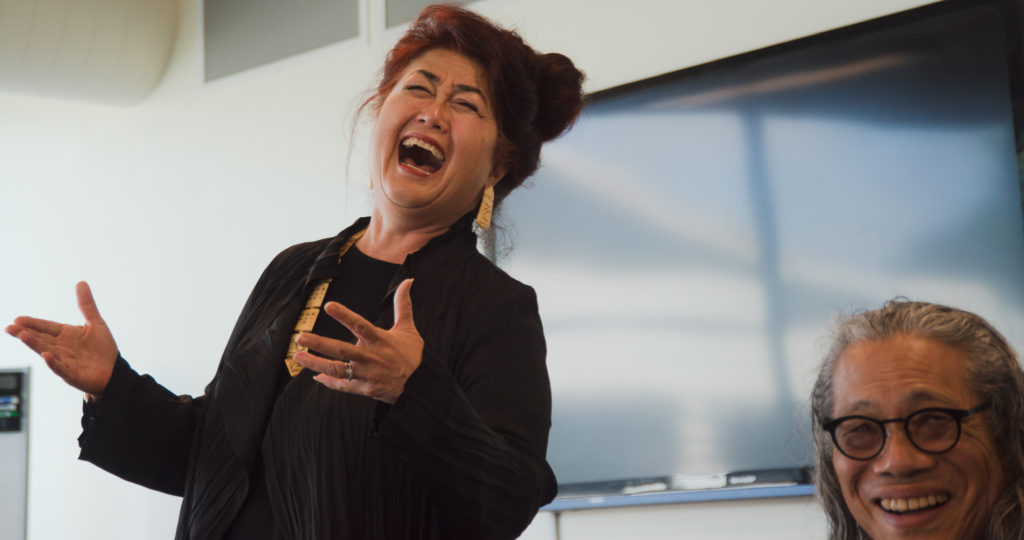Performing artist Brenda Wong Aoki (left) laughs during the Asian Americans in the Arts discussion in J. Paul Leonard Library at SF State on Wednesday, March 20, 2019. (CHRIS ROBLEDO/ GOLDEN GATE XPRESS)
An event designed to bring awareness to the lack of Asian American representation in media and art was held at noon on March 18 in the J. Paul Leonard Library.
Coordinator of Asian American studies and event organizer, Wei Ming Dariotis, created the event, called the “Asian Americans in the Arts” panel. The SF State School of Design and the CSU Entertainment Alliance, a program that focuses on career development for students in arts and media, sponsored the event.
The panel included five Asian American Bay Area-based artists, including Ina Adele Ray, Brenda Wong Aoki, Mark Izu, Robert Kikuchi-Yngojo and Nancy Wang. The artists ranged from playwrights, performers, filmmakers and musicians. The hour-long panel covered topics of cultural awareness, especially within a mixed heritage diaspora, and the monetary issues entwined with being an artist of color.
All of the panelists believed that the most successful way to keep in touch with ancestry and heritage is by being able to explore and claim it in an artistic form.
Dariotis and Hsiao-Yun Chu, a School of Design coordinator, wished to create an environment in which students were able to understand the importance of heritage.
“It’s so important to know your history […] knowing the history of your ancestors really gives you courage,” Chu said. “Knowing that the people who came before you were able to make it in their own way gives you strength.”
Chu posed initial questions about the artists first experiences with their artforms to get the discussion started. Soon after, students asked the artists their own questions. A topic that continually resurfaced was how to survive in the modern world while being a professional artist.
Ray, a filmmaker, reinforced her view that using art for profit does not mean an artist is a “sellout.”
“If you are offered a job that will benefit your art in any way, take it,” Ray said. “You gotta hustle.”
The round table discussion also offered perspectives on how Asian American families can at times guide their children away from art.
Aoki and her husband, Izu, discussed how their son grew up as a dancer and at an early age was advised by his mentors to become a professional. Now working in what his parents call a “regular job,” he misses the art he was once a part of.
“He sometimes tells me that he misses dancing and he wishes he still did it and that gives me some hope that he’ll realize how good it is for him,” Izu said. “He comes from artists, it’s in him.”
SF State student Joyce Bantugan, a panel attendee, finds struggle in honoring her family and their culture while simultaneously being an artist.
“It’s hard to honor your family and your culture when they are condescending of what you do. I create art and I like to do it, but it’s just hard when your family isn’t invested in it like you are,” Bantugan said. “They know I create art, they just don’t care.”
Panelists reminded students to honor Asian American culture and history through their studies and art. Wang and Kikuchi-Yngojo encouraged students to take advantage of the resources like the College of Ethnic Studies at SF State.
Eunice Kim, current graduate student who received her bachelor’s degree in Asian American studies at SF State, sees how her degree allows her to honor her heritage by investing time in her community, for example.
“[Asian American studies is] being able to be an active part of the community. You have to learn from and about the people around you,” Kim said. “It’s very different sitting down and listening to lectures than actually going out and seeing the impact you can make.”
All of the panelists emphasized the importance of learning about personal culture and heritage, especially from relatives.
Izu encouraged others to maintain family history.
“There are many times when I wish that I cherished those moments with my grandparents because now it’s just questions that will go unanswered,” Izu said.
The five panelists agreed that students can be multidimensional, finding professional success while maintaining their creative side and embracing family heritage.











